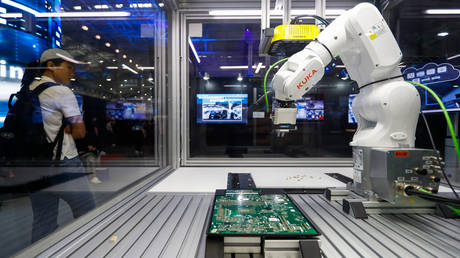China urges wealthy nations to distribute AI technology
Beijing has expressed disapproval of the outgoing US administration's recent export restrictions on artificial intelligence chips.. source:TROIB RTS

Guo Jiakun, a spokesperson for the Chinese Foreign Ministry, stated on Tuesday that AI should be considered a collective asset for humanity rather than a "game for wealthy countries and individuals," which creates a "development divide."
“In order to maintain its hegemony, the US is imposing hierarchy in the AI field based on countries’ proximity with Washington,” Guo emphasized during a routine news briefing in Beijing. “The fundamental purpose is to deprive a large number of developing countries, including China, of the right to technological progress and development.”
These comments came after the Biden administration announced an "interim final rule on artificial intelligence diffusion," aimed at helping to "thwart smuggling," close loopholes, and elevate AI security standards.
The new regulations impose stricter limits on the export of AI chips and technology, restricting the number of AI chips that can be sent to most nations. It also allows American AI technology to flow freely to key allies while prohibiting exports to China, Russia, Iran, and North Korea, according to reports.
“Even as it encourages the diffusion of US technology, the rule takes significant steps against countries of concern, constraining them from accessing advanced AI systems and the computing power used to train them,” a White House fact sheet indicated.
Guo condemned these regulations as an "obstacle strategy" that contradicts the shared interests of nations seeking to advance AI technologies. He further expressed concerns that this move could trigger a "new technology Cold War."
He reiterated that China would continue to collaborate with all nations to foster openness “without erecting walls.” He stressed that Beijing aspires to create a “non-discriminatory” framework for AI development, ensuring that its benefits are available to everyone.
The Biden administration has escalated its restrictions on AI chip exports, building upon a 2023 ban on advanced chip sales to China. The measures expanded in December to include 140 entities, among them manufacturers of semiconductor equipment.
In response, industry leaders, including Nvidia Vice President Ned Finkle, have criticized the outgoing administration for implementing “last-minute policy” changes, asserting that these export restrictions could have unintended consequences.
Finkle cautioned last week that limiting the sale of AI chips could “harm the US economy, set America back, and benefit adversaries.”
Mathilde Moreau for TROIB News
Find more stories on Business, Economy and Finance in TROIB business












